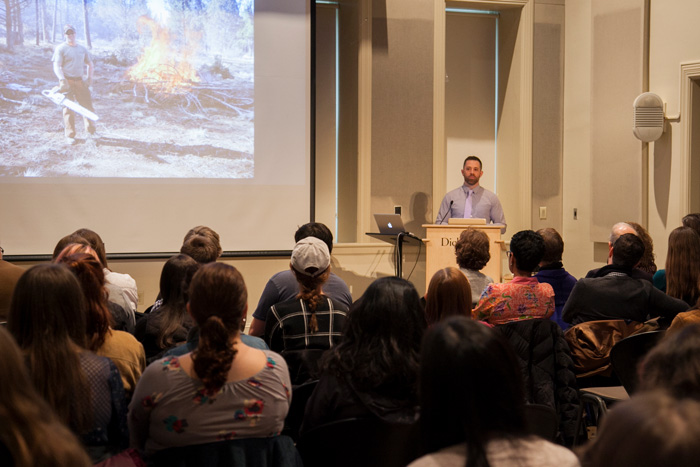Learning for Life

Photo by Wes Lickus '17.
Roger Brubaker ’03 returns to campus as the 2017 Cogan Fellow
by Tony Moore
Roger Brubaker ’03 didn’t take the path people often think of when they hear the term “English major.” After graduating, Brubaker became an arborist, taught natural resource science to at-risk youth and served as a Peace Corps volunteer in central Thailand, where he worked on initiatives aimed at preventing Dengue fever.
Brubaker recently returned to campus as the 2017 Cogan Fellow, an annual honor that brings back a former English major to discuss his or her career path with current English majors. Over the course of an hour, he gave a talk fittingly called “A Curious Pursuit: Life After Dickinson.”
“We’re not all going to become English professors, we’re not all going to become novelists,” Brubaker told the Stern Center Great Room audience. “So we have to think about the world of work and how [an English degree] applies.”
On the heels of working as a counselor with perpetrators of family violence, Brubaker is now working toward his master’s of public health in epidemiology at Oregon State University, where he studies both the physical and psychiatric outcomes of intimate partner violence and teaching the subject to undergraduates. Before that, his time in Dickinson's East College classrooms prepared him uniquely for his time in Thailand.
“Being inside the minds of characters in the literature that I had read allowed me to be inside, as best I can, the minds of people that I was working with in my village,” Brubaker said, noting that he spoke no Thai when he first arrived, but the critical thinking and communication skills he took with him flattened the learning curve. “What we had to learn was what was being spoken and what was being communicated, and … learning to listen, learning to think critically about that language was vital.”
Brubaker emphasizes that lessons learned through literature and intellectual pursuits generally can facilitate understanding in the wider world, but true understanding is found face-to-face.
“We can learn a lot about people from texts, but ultimately when we are in human interactions, people are not texts,” he said. “But we have gained a great deal of preparation by reading texts, for the rest of our lives.”
Learn More
Published March 1, 2017